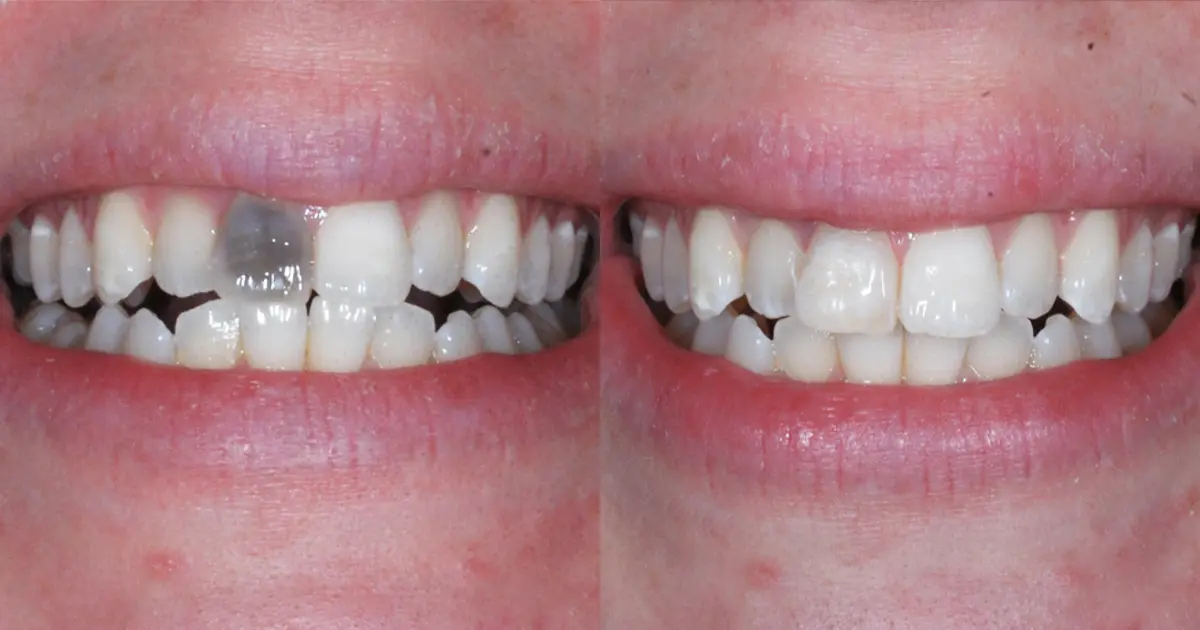
Stop Black Teeth: Prevention Tips for a Brighter Smile
A bright smile isn’t just about aesthetics - it’s often a reflection of overall oral health. But when one or more teeth start turning black, it can be alarming and potentially signal serious underlying dental issues.
Understanding what causes black teeth, how to prevent them, and which treatments are available can help you preserve your smile and oral health for years to come.
At Brighton Implant Clinic, we believe education is the first step toward prevention. This article will guide you through the causes, prevention tips, and treatment options for black teeth, combining insights from modern dentistry and real-world patient care.
What Are Black Teeth?

Black teeth refer to teeth that have darkened significantly—either turning fully black or developing black spots or streaks. Unlike mild yellowing caused by coffee or tea, black teeth usually indicate more than surface staining.
Teeth can appear black due to external stains or internal decay. Sometimes, the discoloration is gradual, starting as brown or dark grey before becoming black. Whether affecting a single tooth or several, the black color is often a red flag for compromised dental health and should not be ignored.
In many cases, black teeth are associated with a dead tooth, meaning the inner pulp has lost its blood supply and begun decomposing. This condition may or may not be accompanied by pain, which is why regular dental checkups are crucial for early detection.
Extrinsic Causes: Surface-Level Stains
Black teeth are not always due to decay. Some are simply caused by stains on the enamel—this is known as extrinsic discoloration. These are generally easier to treat than internal causes.
Common extrinsic causes include:
- Tobacco use: Smoking or chewing tobacco deposits tar and nicotine on the enamel, often along the gum line.
- Dark-colored beverages: Frequent consumption of coffee, tea, red wine, and cola can stain your teeth.
- Poor oral hygiene: Infrequent brushing allows plaque and tartar buildup, which can harden into black tartar.
- Metal exposure: Iron supplements and water with high iron content can lead to black lines or patches on teeth.
These surface stains may initially be light in color, but without intervention, they can darken over time and cause your teeth to appear black or grey.
Intrinsic Causes: Deep-Seated Discoloration

When the black color originates within the tooth, we refer to it as intrinsic discoloration. This often involves damage to the pulp of the tooth or internal decay and requires more advanced treatment.
Primary intrinsic causes of black teeth include:
- Tooth decay: When decay progresses beyond the enamel and into the dentin or pulp, the tooth may appear black due to necrotic tissue.
- Trauma: An impact can disrupt blood flow to the pulp, causing it to die and darken over time.
- Failed dental work: Old fillings or crowns that leak can stain the underlying tooth.
- Medication use: Tetracycline antibiotics taken during childhood, or during pregnancy, can discolor developing teeth.
If your tooth has turned black from the inside out, it’s essential to see a dentist as soon as possible. Left untreated, this condition may lead to infection, abscess formation, or even tooth loss.
Diagnosing the Root Cause
Determining the precise reason for tooth discoloration is critical to providing the best treatment. A dentist will begin with a thorough clinical examination and may recommend diagnostic imaging such as X-rays to evaluate the pulp and root of the tooth.
Your dentist will assess:
- The location and extent of the discoloration
- Whether the discoloration is removable
- Signs of gum disease or abscess
- Whether the tooth is vital or non-vital (alive or dead)
This evaluation helps identify whether the cause is superficial or internal, traumatic or decay-related, and whether intervention such as root canal treatment or extraction is necessary.
Preventative Measures: Daily Habits

The foundation of preventing black teeth lies in strong, consistent oral hygiene. While not all causes of discoloration are avoidable, most are manageable with good habits.
Daily practices to prevent black teeth:
- Brush twice daily using a fluoride toothpaste and a soft-bristled toothbrush.
- Floss daily to remove plaque between teeth and under the gum line.
- Use a mouthwash that targets plaque buildup.
- Avoid tobacco in all forms, as it is one of the leading causes of black staining.
- Drink water after meals to rinse the mouth and reduce staining.
By maintaining a clean and healthy oral environment, you reduce the risk of tartar buildup and prevent decay that could cause teeth to turn black.
Professional Preventative Care
While at-home care is essential, professional dental care is equally important in preventing black teeth and catching problems early.
Brighton Implant Clinic offers:
- Dental check-ups every six months to monitor oral health and detect early signs of decay.
- Professional cleaning by hygienists, which removes hardened plaque and tartar that cannot be removed by brushing alone.
- Fluoride treatments, which strengthen enamel and make it more resistant to decay.
- Oral cancer screening, which may be recommended if unusual discoloration is observed.
Patients with a history of gum disease, frequent cavities, or lifestyle risk factors should consider more frequent cleanings.
Treatment Options for Black Teeth
Once teeth have turned black, professional dental treatment becomes necessary. The type of treatment depends on the cause and severity.
Advanced Cosmetic Solutions at Brighton Implant Clinic
At Brighton Implant Clinic, we offer advanced cosmetic and restorative treatments to restore both function and aesthetics to discoloured teeth.
Our most effective solutions include:
- Teeth whitening: For extrinsic stains, using safe and effective methods.
- Internal whitening: For darkened teeth after root canal treatment.
- Dental crowns: To cover and protect structurally compromised teeth.
- Veneers: Thin porcelain coverings for the front of teeth.
- Dental implants: For teeth that cannot be saved and require replacement.
Our Digital Smile Design technology allows you to preview your new smile before treatment begins.
The Role of Nutrition and Lifestyle
Your diet and lifestyle can influence both the color and the strength of your teeth.
To support a healthy, stain-free smile:
- Eat calcium-rich foods like dairy, almonds, and leafy greens to strengthen enamel.
- Include crunchy fruits and vegetables to naturally clean teeth surfaces.
- Avoid sugary and acidic foods that weaken enamel and promote decay.
- Quit smoking or chewing tobacco to prevent black lines and tartar.
A nutritious diet not only supports your general health but also reinforces your teeth and gums.
Long-Term Maintenance for a Brighter Smile
A bright, healthy smile requires ongoing care. Even after professional treatment, neglecting oral hygiene can cause black stains or decay to return.
Long-term strategies include:
- Keeping up with biannual dental visits
- Replacing toothbrushes every 3–4 months
- Watching for early signs of tooth turning black
- Using whitening toothpaste as recommended
- Addressing orthodontic concerns to avoid hard-to-clean areas
A proactive approach, paired with expert support from your dental team, can help you maintain a bright and confident smile for years.
Frequently Asked Questions
What causes black teeth?
Black teeth may result from poor oral hygiene, tobacco use, advanced tooth decay, trauma, or dead dental pulp. In some cases, staining from food and drink can also darken teeth over time.
Can black teeth be whitened?
Yes—if the cause is surface staining. However, internal discoloration usually requires more advanced treatments such as root canal therapy or dental crowns. A dentist will recommend the best option based on the condition.
Is a black tooth always a dead tooth?
Not always, but it’s a common sign. When a tooth dies, the pulp tissue inside begins to decay, causing a dark or black appearance. It’s important to get this assessed to prevent infection or tooth loss.
How can I prevent my teeth from turning black?
The most effective prevention methods include brushing twice daily, flossing, avoiding staining foods and tobacco, and having regular dental checkups and cleanings.
What services does Brighton Implant Clinic offer for black teeth?
We offer professional teeth whitening, root canal treatment, veneers, crowns, and dental implants—each tailored to the specific cause of discoloration.
Conclusion: Embrace a Healthier, Brighter Future
Black teeth can be a source of anxiety and embarrassment, but they also signal deeper oral health concerns that shouldn't be ignored. Fortunately, most causes of black teeth are preventable and treatable with modern dental care.
At Brighton Implant Clinic, we specialize in diagnosing and treating tooth discoloration—from professional cleanings and whitening to advanced restorative procedures. If you’ve noticed a tooth turning black or want to restore the brightness of your smile, don’t wait. Book an appointment today at one of our Sussex clinics and let our expert team help you smile with confidence once again.
👉 Visit us online at brightonimplantclinic.co.uk or call your nearest branch to schedule a consultation.










